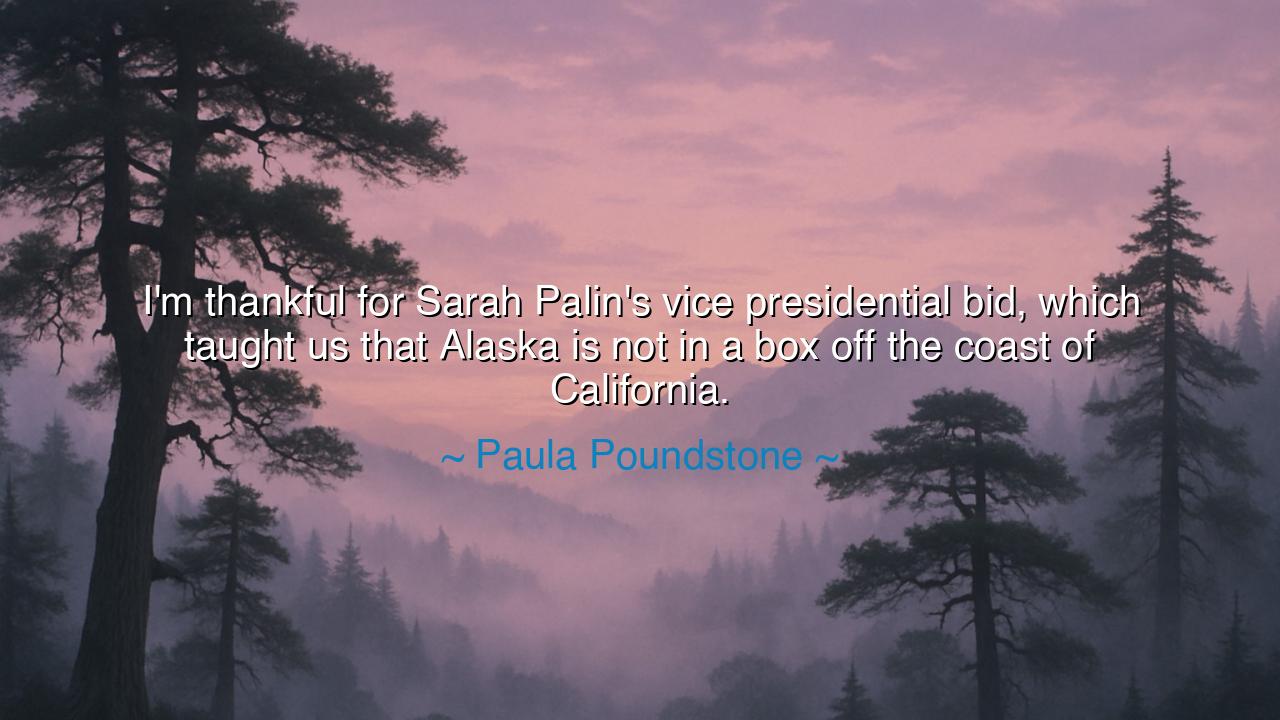
I'm thankful for Sarah Palin's vice presidential bid, which
I'm thankful for Sarah Palin's vice presidential bid, which taught us that Alaska is not in a box off the coast of California.






Paula Poundstone, with her wit sharpened like the blade of a sage disguised as a jester, once declared: “I’m thankful for Sarah Palin’s vice presidential bid, which taught us that Alaska is not in a box off the coast of California.” At first hearing, the words may provoke laughter, for they play upon a childlike misconception born of the simple maps of our schools. But beneath the humor lies a deeper truth: that public moments, even those born in politics, often awaken a people to realities they have long overlooked. Gratitude, in this case, is not for triumph or policy, but for knowledge itself—knowledge that transforms the vague into the real.
The origin of this reflection rests in the 2008 United States presidential election, when Sarah Palin, then governor of Alaska, became the Republican vice presidential candidate. Suddenly, a state once distant in the minds of many citizens was thrust into the center of national attention. People who had seen Alaska only as a square on the corner of their schoolroom map now began to grasp its true geography, its immensity, its nearness to Russia, its rugged beauty, and its importance. What had once been reduced to a box off the coast of California was revealed to be a land of its own, full of life and weight in the nation’s story.
The ancients understood this phenomenon: that sometimes great events or great figures serve not to introduce entirely new truths, but to awaken the people to what has always been present. When Alexander journeyed eastward, he revealed to Greece that vast lands and peoples lay beyond their horizon. When Marco Polo returned from Asia, he reminded Europe that the world was far larger and richer than their familiar maps suggested. Likewise, Palin’s campaign—whatever one thought of her politics—became a moment in which Americans were reminded of Alaska’s place not as a footnote, but as a living part of their union.
Poundstone’s thankfulness is rooted in this awakening. Through satire, she honors the gift of recognition: that moments of visibility can shatter ignorance and broaden perspective. Her words remind us that humor can be a vessel of wisdom, revealing how often we reduce the complex world into small, convenient boxes. Gratitude arises not only when we are given something new, but when we are forced to see more clearly what was there all along.
Consider the example of Galileo, who, pointing his telescope toward the heavens, showed mankind that the stars and planets were not as fixed or simplistic as once believed. Many resisted, for it is uncomfortable to leave behind familiar illusions. Yet truth demanded acknowledgment. So too with Alaska: for decades it was reduced in the minds of many to a corner-square on a classroom wall. Palin’s bid shattered that illusion, and even through satire, Poundstone acknowledges the value of that moment.
The deeper lesson is this: we must be wary of the boxes into which we place people, places, and even ideas. For when we shrink the world into neat symbols, we blind ourselves to its reality. True wisdom lies in seeing things as they are, not as we find it convenient to imagine them. Gratitude is the posture of the humble, who recognize that even unexpected or imperfect events can bring about revelation.
Practical action flows naturally. Do not rest content with the simplified images handed to you. Learn, seek, and question. When events force your eyes open—whether through politics, travel, or even satire—do not resist, but give thanks, as Poundstone does. For every unveiling of truth is a chance to live more deeply in reality, to shed illusion, and to honor the fullness of the world around you.
Thus, Paula Poundstone’s words endure not only as a jest, but as a teaching: that thankfulness belongs not only to moments of grandeur, but even to those flashes of clarity when the world surprises us into learning. And as she shows, wisdom often arrives clothed in laughter, yet bearing the power to strip away the boxes in which we confine our vision.






AAdministratorAdministrator
Welcome, honored guests. Please leave a comment, we will respond soon